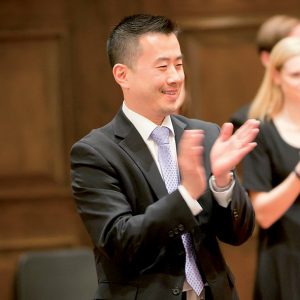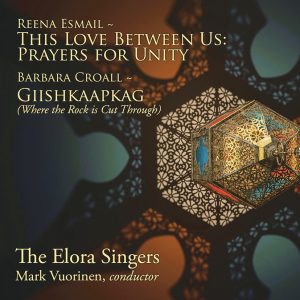CD Review: This Love Between Us - The Elora Singers
CD Review by T. J. Harper, D. M. A.
This Love Between Us
The Elora Singers
Mark Vuorinen, conductor
Maureen Forrester Recital Hall
Wilfrid Laurier University, Waterloo, Ontario, Canda
(2020, 53’ 48”)
www.elorasingers.ca
It is not often when a choral recording manages to capture the vastness of universal themes and simultaneously places an apt spotlight on the humanitarian crises afflicting women and young girls around the world due to the violence created implicitly in colonization. What places this recording in a wholly new category are the profoundly impactful compositional voices of Indian-American composer Reena Esmail, and Odawa First Nation composer Barbara Croall.
In This Love Between Us, conductor Mark Vuorinen has managed to deftly capture the emotional substance communicated through the musical offerings of Reena Esmail: This Love Between Us; Prayers for Unity, tracks #1-7; and Barbara Croall: Giishkaapkag (Where the Rock is Cut Through), track #8. Recorded by The Elora Singers on July 29 & 30, 2019 in Maureen Forrester Recital Hall at Wilfrid Laurier University in Waterloo, Ontario, this latest offering from Mark Vuorinen provides a concise, tightly-knit tapestry of seemingly disparate languages, religious traditions, and musical heritages.
This Love Between Us: Prayers for Unity
Indian American composer Reena Esmail
Centered on the seven major religious traditions of India (Buddhism, Sikhism, Christianity, Zoroastrianism, Hinduism, Jainism, and Islam), Indian-American composer Reena Esmail’s This Love Between Us presents a grand vision for unity through the different faith traditions in India. Esmail, who strives to “bring communities together through the creation of equitable musical spaces”, effectively creates a prismatic juxtaposition within which the concept of unity is realized as an ever-present force for goodwill and affirmation. Unlike earlier attempts by composers to create a composite musical experience through the use of religion and/or familiar texts (i.e., The Armed Man by Karl Jenkins, or Requiem for Peace by Larry Nickel), This Love Between Us carefully examines our shared commonality through the duality of western and eastern musical practices and successfully integrates the multi-dimensional lens of seven seemingly disparate faith traditions into one artistic voice.
The seven movements of this insightful and oft-times celebratory work draw the listener into the experience explicitly through a process the composer describes as a simultaneous union where “each text is itself set in English and in its original language … so you can hear the beauty of the original and grasp its meaning through translation.” Esmail further reinforces this concept by combining Indian and Western classical compositional styles, techniques, traditions, and instrumentation (sitar and tabla with Baroque orchestra). This merging of styles is clearly evidenced in Track V. Hinduism which dramatically foregrounds the sitar and Track VI. Jainism and its use of driving rhythms created by the tabla and orchestral accompaniment.
The humanistic truth at the heart of this work lies in the implicit messages in the selected texts which acknowledge our universal “One-ness” but also recognize the ever-present struggle we all face when learning to accept those who are different from us, whose faith traditions are unfamiliar, and those with whom we do not agree. In response to this, Esmail reminds the listener to focus on the last affirming lines of this work from Rumi: “Concentrate on the Essence. Concentrate on the Light.”
The text sources for each track are listed here:
- Track I. Buddhism: Dhammapada (Buddhist text) (Danda Vagga – 10:129-132) (English and Pali)
- Track II. Sikhism: Guru Granth Sahib (p. 1238) (English and Gurumukhi)
- Track III. Christianity: Romans 13:8-13 (Bible) (English and Malayalam)
- Track IV. Zoroastrianism: Pahlavi Rivayat (8a8) (English and Pahlavi)
- Track V. Hinduism: Isa Upanishad (verses 6-7) and selections from Kabir (English and Hindi)
- Track VI. Jainism: Acharanga Sutra (Jain text) (Part 3: Lecture 15) (English and Adha Maghadi)
- Track VII. Islam: Rumi (along with affirming phrases in other religions)
Giishkaapkag (Where the Rock is Cut Through, 2019)
Odawa First Nation composer, Barbara Croall
The concept of unity through the careful marriage of musical styles and cultural traditions is clearly evident in Giishkaapkag (Where the Rock is Cut Through) by Odawa First Nation composer, Barbara Croall. However, in stark contrast to the principled themes presented in the music of Reena Esmail, Barbara Croall unapologetically confronts our collective quiescent acknowledgement with unabashed outrage at the violence visited upon women and girls throughout time. The thematic contrasts are audibly illustrated through the use of a traditional cedar flute, or Pipigwan, performed by the composer on this recording against the backdrop of intermittent classical orchestral forces.
In the program notes for Giishkaapkag (Where the Rock is Cut Through), Barbara Croall writes,
“As Nishinaabeg, we know of the rocks as the most ancient beings since this earth was created. When the rocks…are violated, it represents a violence to the feminine in creation. Due to Colonization, many women and girls have suffered…countless waves of violence, have disappeared…and have died…due to the many past and ongoing violations of Shkakmigkwe (Mother Earth). The rocks bear witness and speak to us of this.”
The frenetic nature of this work overtly expresses the “violence to the feminine in creation” as well as the very real violence against women and girls. In concurrent and persistent iterations of visceral vocalizations by the choir we hear the voices of women and girls, the sound of laughter, nature, birds, heartbeat, rattlesnakes, and wolves. Ultimately, the rocks bear witness to everything and the “ancient voices transcending time emerge from these rocks”, and speak to us. Barbara Croall reminds us that it is up to us to listen.
The Elora Singers are an all-professional Grammy- and JUNO-nominated chamber choir founded in 1980. They have an established reputation as one of the finest chamber choirs in Canada with a commitment to Canadian repertoire and twelve releases on the NAXOS label. The Elora Singers are known for their “rich, warm sound and clarity of texture…and collaborations with other Canadian and international artists.” Conductor Mark Vuorinen is also the artistic director of the Waterloo Regions Grand Philharmonic Choir, Associate Professor and Chair of Music at Conrad Grebel University College at the University of Waterloo.
 T. J. Harper is Associate Professor of Music, Director of Choral Activities and Chair of the Department of Music at Loyola Marymount University in Los Angeles, CA. He conducts the University’s three choral ensembles as well as courses in Conducting, Secondary Choral Methods, Applied Conducting, and Applied Voice. Dr. Harper received the Doctor of Musical Arts degree from the University of Southern California where he graduated with honors. www.harpertj.com
T. J. Harper is Associate Professor of Music, Director of Choral Activities and Chair of the Department of Music at Loyola Marymount University in Los Angeles, CA. He conducts the University’s three choral ensembles as well as courses in Conducting, Secondary Choral Methods, Applied Conducting, and Applied Voice. Dr. Harper received the Doctor of Musical Arts degree from the University of Southern California where he graduated with honors. www.harpertj.com
Edited by Claire Storey, UK
